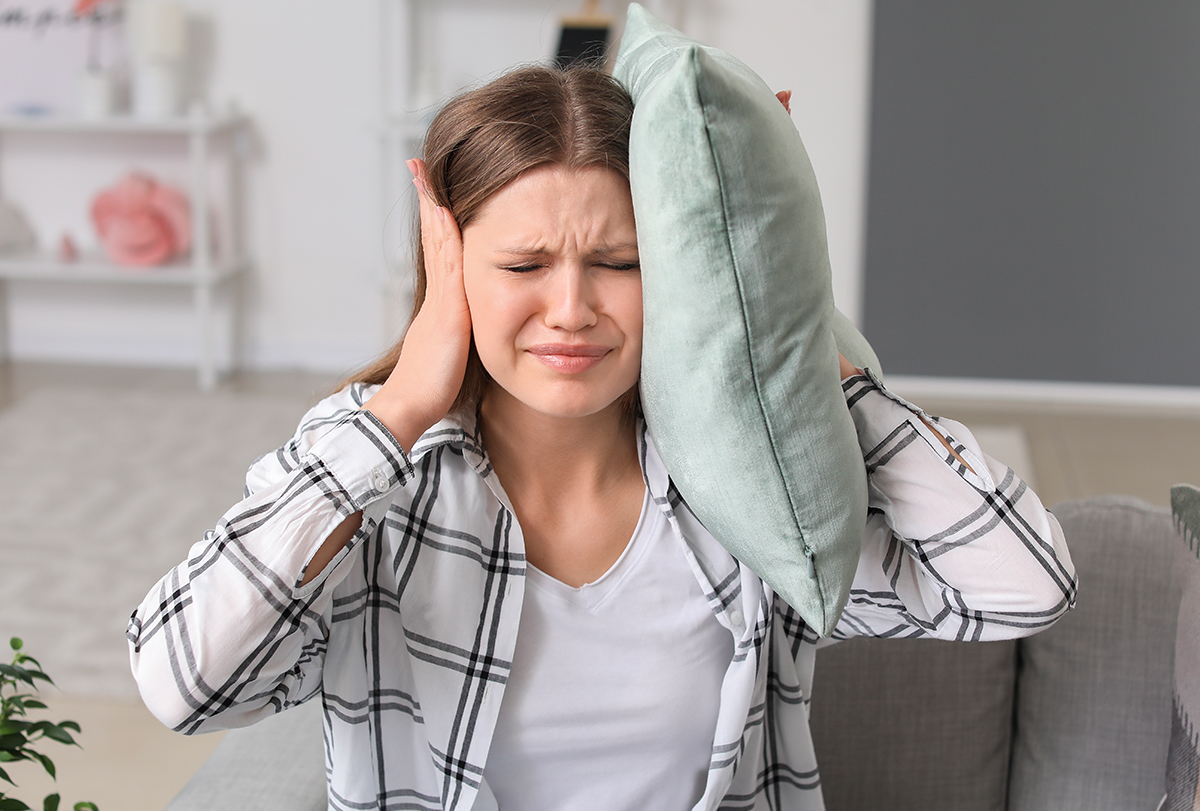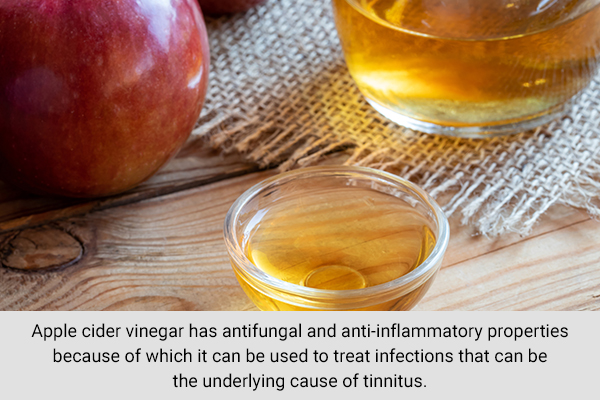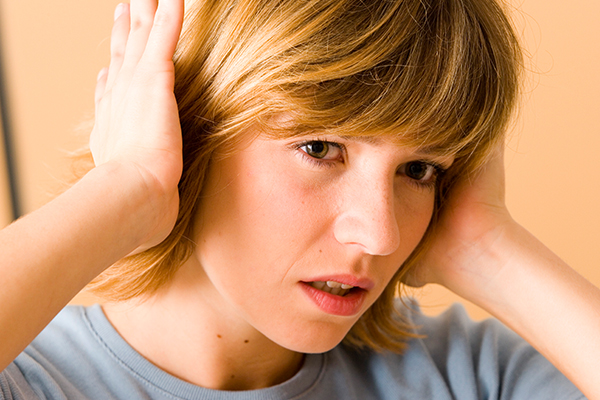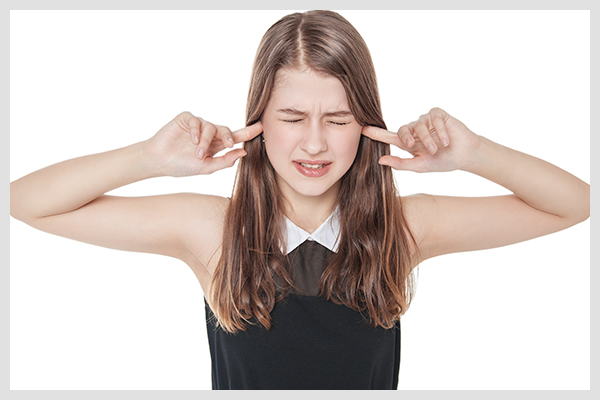In this article:
Many people have experienced transient ringing in the ears or some other sound without understanding its cause. This condition is referred to as tinnitus.

In simple words, tinnitus is defined as a ringing sound in the ears that can be present for a brief period or can be constant. The sound can be in both ears or one of them. (1)
Home Remedies for Tinnitus
It is not easy to find out what exactly is causing tinnitus, but there are ways you can reduce the ringing in your ears naturally.
Here’s how you can manage your case of tinnitus with simple home remedies.
1. Onion juice can help
Onions have antibacterial properties and other medicinal benefits that can be useful in treating infections that may be causing your tinnitus.
All you have to do is cut onions into small pieces, microwave them, and strain them to extract the juice. Put this onion juice in your ear and leave it there for a few minutes. Drain the juice out by tilting your head. Do this a few times every week to see improvement in your condition. (2)
Any side effects experienced should be reported to a medical professional immediately.
2. Use a saline solution
Saline solution is very helpful in opening blocked passages or getting rid of excess fluid that can be causing tinnitus. This is a very good solution for those who suffer from tinnitus caused by clogged sinuses.
In a warm glass of water, add salt to make a saline solution and also glycerin. Put the solution in each of your nostrils to open up and clear blocked nasal passages to reduce the chances and cases of tinnitus. (3)
3. Put a few drops of warm mustard oil in the ear(s)
Mustard oil increases blood circulation naturally since it is a rubefacient. It also has antifungal and anti-inflammatory properties and thus is very helpful in treating infections in your ear.
Moreover, mustard oil prevents the buildup of earwax, which can also be a cause of tinnitus.
Microwave a small amount of mustard oil until it is warm, and put a few drops of it in the affected ear. Let it stay there for a few minutes, and then tilt your head to drain it out. Repeat it every day for a few weeks to reap its benefits. (4)

4. Consume pineapple
Shifting to a more anti-inflammatory diet reduces tinnitus and prevents any progression of age-related hearing loss.
Pineapple naturally has anti-inflammatory properties because of an enzyme it contains called bromelain. Therefore, consuming pineapple every day is a good way to deal with tinnitus and reduce your chances of getting it. (5)
5. Include pumpkin in your diet
Pumpkin is another food that is rich in vitamin A and can help you get rid of tinnitus.
Vitamin A is an important nutrient that ensures the proper functioning of the ears. Vitamin A deficiency has been linked to ear problems, tinnitus being one of them. (6)
Include pumpkin in your diet as much as possible for your ear health. (7)
6. Consume ginger
Ginger has healing properties as it improves blood circulation. It is also a good antioxidant and reduces the inflammatory response and related symptoms such as pain, which is helpful in dealing with tinnitus.
Grate ginger and add it to a cup of hot water, steep, and strain to make ginger tea. Drink this tea at least twice a day for its benefits.
Other than drinking ginger tea, you can also chew a few pieces of ginger every day. (8)

7. Try Ginkgo biloba extract
Based on various research studies, the use of Ginkgo biloba extract has been deemed helpful in the treatment of tinnitus over placebo. The effectiveness of the ginkgo preparation depends upon its quality, the bioavailability of its active compounds, and the extraction process used to formulate the product.
Although not all patients may benefit from this remedy, a considerable amount of improvement enough to enhance the quality of life of patients has been observed. (9)
8. Take zinc supplements
Zinc is an important oligoelement that plays a vital role in physiological functions including central neurotransmission. It acts as the first line of defense against free radical damage in the cochlea.
Studies have shown that altered zinc physiology could be linked to tinnitus. Current evidence also reveals clinical improvement in cases of tinnitus with zinc supplementation.
Talk to your medical advisor about zinc supplementation if you suffer from tinnitus. (10)
9. Consume apple cider vinegar

It is well known that apple cider vinegar has antifungal and anti-inflammatory properties, because of which it can be used to treat infections that can be the underlying cause of tinnitus. It also balances pH levels in the body.
To consume apple cider vinegar, you can mix 2 teaspoons of it in a glass of water and drink it at least twice a day. (11)
The benefits of this remedy have been shared by professionals in the field from experience, but still more research on it is needed. So, look out for and report any side effects to your healthcare provider.
What Causes Tinnitus?
The common causes of tinnitus are:
- Age-related issues
- Hearing loss (for persistent tinnitus)
- An ear infection
- Injury to the ears
- Loud noises
- Traveling to a higher altitude
- Respiratory infections
- Vitamin deficiencies
- Abnormal ear bone growth
- Blockage due to ear wax
- Chronic conditions such as heart issues and diabetes (1)
Symptoms of Tinnitus
Although in most cases, tinnitus does not persist for a long duration, it can still be very difficult to deal with because it makes it very hard for a person to sleep, concentrate, or just do their daily chores. (1)

Symptoms of tinnitus can include:
- Noises in the ear such as buzzing, hissing, clicking, roaring, and humming
- Anxiety
- Dizziness
- Sleep disruption
Treatment for Tinnitus
The treatment for tinnitus depends upon what’s causing it, although the symptoms can be helped by:
- Removing earwax that causes blockage in the ears
- Treating any underlying blood vessel conditions
- Using hearing aids for age-related tinnitus
- Taking medication after talking to your doctor
- Using devices for noise suppression
- Counseling treatment such as cognitive-behavioral therapy
- Managing stress – Emotional stress is oftentimes linked with hearing symptoms or discomfort in the ears such as tinnitus and dizziness. Stress should be avoided as it contributes to the onset or worsening of tinnitus. (12)
- Avoiding exposure to excessive noise and other factors that may cause ear damage
Diagnosing Tinnitus
There is no standard procedure for the diagnosis of tinnitus. It depends upon the medical professional assessing your case. Sometimes, psychoacoustic measures of tinnitus (pitch, loudness, minimum masking level) may be done.
After the diagnostic procedures, if recommended by an ENT professional, these must be done:
- Audiometry to strike off associated hearing loss.
- An MRI to rule out retrocochlear lesion if tinnitus is in one ear
Additional Tips to Deal With Tinnitus
There are some lifestyle modifications and behavioral changes that you can implement in your life to reduce the symptoms of tinnitus. These include: (13)
- Stress management
- Daily exercise
- Dietary modifications such as increased intake of vitamin B12 and zinc
- Meditation
- Proper cleaning of the ears
- Avoiding the use of cotton earbuds
You may think that cleaning the ears using cotton earbuds is useful, but injuries to the ears, nose, and throat caused by the use of cotton buds are common. (14)
Thus, the use of cotton buds for ear cleaning has largely been denounced globally by otolaryngologists. This is because of the complications that can arise from their usage, including trauma, impacted ear wax, infection, and retention of the cotton bud. (15)
When to See a Doctor
In most cases, tinnitus is not a serious health issue and is not considered a medical emergency. However, it can be hard to sleep or work normally if you suffer from it, for which you should consult a doctor.
Moreover, if you experience the following symptoms, then you may need to get professional help as soon as possible: (13)
- Paralysis in the facial area
- Loss of hearing
- Discharge from the ears
Most-Asked Questions About Tinnitus (Ringing in the Ears)

Can tinnitus be cured naturally?
A natural treatment for tinnitus is hardly possible, and drug treatment options are limited. There is really no fixed therapy for all kinds of tinnitus.
Current treatment regimen may include the use of hearing aids, supportive therapy including tinnitus retraining therapy, and different medications. (9)
What is pulsatile tinnitus?
Pulsatile tinnitus is a type of tinnitus where you constantly hear a sound in your ears from a physical source such as blood circulating through your blood vessels. The main symptom suffered by those who have pulsatile tinnitus is hearing a sound that is in sync with your pulse or heartbeat. (16)
What is cognitive-behavioral therapy?
Tinnitus can be associated with an increased risk of emotional issues such as depression, anxiety, and insomnia. This is why cognitive-behavioral therapy is a good way to adjust to your life with tinnitus.
Cognitive behavioral therapy is known to improve the quality of life of those who suffer from tinnitus. It involves psychological interventions and therapy to improve the condition and irritation that comes with the condition.
What are some ways to manage tinnitus?
Clinical management of tinnitus can include various different strategies such as:
- Awareness and education
- Relaxation exercises
- Tinnitus retraining therapy
- Cognitive-behavioral therapy
- Sound enrichment
- Hearing aids
- Drug therapies
Recently, people, especially youngsters, have become addicted to using headphones.
An association between earphone use and tinnitus and anxiety or depression was found in a study. The extended constant use of headphones causes many health issues ranging from anxiety to hearing loss and even tinnitus. (17) Thus, you should never use headphones continually at over 60% of the maximum volume.
Final Word
Above are some remedies you can try to manage tinnitus, in addition to talking to a medical professional to make sure that nothing serious is causing the condition and to discuss treatment options.
- Was this article helpful?
- YES, THANKS!NOT REALLY


